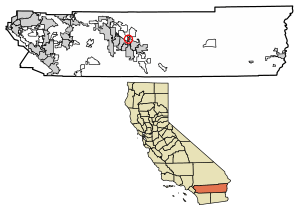Desert Palms, California facts for kids
Quick facts for kids
Desert Palms
|
|
|---|---|

Location of Desert Palms in Riverside County, California.
|
|
| Country | United States |
| State | California |
| County | Riverside |
| Area | |
| • Total | 2.67 sq mi (6.92 km2) |
| • Land | 2.67 sq mi (6.92 km2) |
| • Water | 0.00 sq mi (0.00 km2) 0.03% |
| Elevation | 112 ft (34 m) |
| Population
(2020)
|
|
| • Total | 6,686 |
| • Density | 2,503.18/sq mi (966.59/km2) |
| Time zone | UTC-8 (Pacific (PST)) |
| • Summer (DST) | UTC-7 (PDT) |
| ZIP Code |
92211
|
| GNIS feature ID | 2629131 |
Desert Palms is a census-designated place in the Coachella Valley of eastern Riverside County, southern California. A gated 55+ senior living community, Sun City Palm Desert, comprises the majority of the included area.
Sun City Palm Desert
Sun City Palm Desert is a master-planned retirement community located on the north side of Interstate 10, just northeast of the city limits of Palm Desert, and about 7.7 miles from downtown Palm Desert. All residences in the community use Palm Desert, CA 92211 as part of their address. The community association address is 38180 Del Webb Blvd., Palm Desert, CA 92211.
Sun City Palm Desert was developed by Del E. Webb Corp. (acquired by Pulte Homes in 2001). Construction began in 1992 and was completed in 2003. The original name was Sun City Palm Springs from 1991 to 1996.
Sun City Palm Desert is an active 55+ gated retirement community, with 9,000 residents, 5,000 all single-level homes, 1,600 acres, and numerous amenities and activities for its residents.
Geography
Desert Palms is in the Colorado Desert, at an elevation of 112 feet (34 m).
According to the United States Census Bureau, the CDP covers an area of 2.7 square miles (6.9 km2), 99.97% of it land and 0.03% of it water. The 2010 United States census reported Desert Palms's population was 6,957.
Demographics
| Historical population | |||
|---|---|---|---|
| Census | Pop. | %± | |
| 2020 | 6,686 | — | |
| U.S. Decennial Census | |||
At the 2010 census Desert Palms had a population of 6,957. The population density was 2,604.5 inhabitants per square mile (1,005.6/km2). The racial makeup of Desert Palms was 6,728 (96.7%) White, 59 (0.8%) African American, 16 (0.2%) Native American, 95 (1.4%) Asian, 5 (0.1%) Pacific Islander, 15 (0.2%) from other races, and 39 (0.6%) from two or more races. Hispanic or Latino of any race were 177 people (2.5%).
The whole population lived in households, no one lived in non-institutionalized group quarters and no one was institutionalized.
There were 4,104 households, 11 (0.3%) had children under the age of 18 living in them, 2,424 (59.1%) were opposite-sex married couples living together, 71 (1.7%) had a female householder with no husband present, 23 (0.6%) had a male householder with no wife present. There were 120 (2.9%) unmarried opposite-sex partnerships, and 46 (1.1%) same-sex married couples or partnerships. 1,381 households (33.7%) were one person and 1,208 (29.4%) had someone living alone who was 65 or older. The average household size was 1.70. There were 2,518 families (61.4% of households); the average family size was 2.04.
The age distribution was 17 people (0.2%) under the age of 18, 8 people (0.1%) aged 18 to 24, 67 people (1.0%) aged 25 to 44, 1,081 people (15.5%) aged 45 to 64, and 5,784 people (83.1%) who were 65 or older. The median age was 74.1 years. For every 100 females, there were 79.2 males. For every 100 females age 18 and over, there were 79.0 males.
There were 5,055 housing units at an average density of 1,892.4 per square mile, of the occupied units 3,747 (91.3%) were owner-occupied and 357 (8.7%) were rented. The homeowner vacancy rate was 2.4%; the rental vacancy rate was 17.7%. 6,420 people (92.3% of the population) lived in owner-occupied housing units and 537 people (7.7%) lived in rental housing units.
See also
 In Spanish: Desert Palms para niños
In Spanish: Desert Palms para niños


